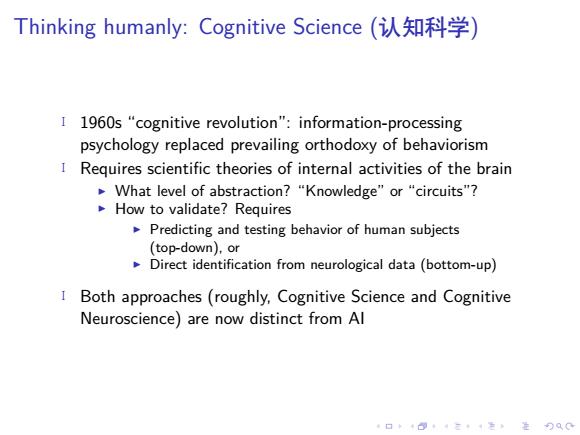
Thinking humanly:Cognitive Science(认知科学) I 1960s "cognitive revolution":information-processing psychology replaced prevailing orthodoxy of behaviorism I Requires scientific theories of internal activities of the brain -What level of abstraction?“Knowledge”or“circuits"? How to validate?Requires Predicting and testing behavior of human subjects (top-down),or Direct identification from neurological data(bottom-up) I Both approaches (roughly,Cognitive Science and Cognitive Neuroscience)are now distinct from Al 4口◆4⊙t1三1=,¥9QC
. . . . . . . . . . . . . . . . . . . . . . . . . . . . . . . . . . . . . . . . Thinking humanly: Cognitive Science (认知科学) ▶ 1960s “cognitive revolution”: information-processing psychology replaced prevailing orthodoxy of behaviorism ▶ Requires scientific theories of internal activities of the brain ▶ What level of abstraction? “Knowledge” or “circuits”? ▶ How to validate? Requires ▶ Predicting and testing behavior of human subjects (top-down), or ▶ Direct identification from neurological data (bottom-up) ▶ Both approaches (roughly, Cognitive Science and Cognitive Neuroscience) are now distinct from AI

Thinking rationally:Laws of Thought 1 Normative (or prescriptive)rather than descriptive I Aristotle(亚里士多德):what are correct arguments/,thought processes? Several Greek schools developed various forms of logic: notation and rules of derivation for thoughts;may or may not have proceeded to the idea of mechanization I Direct line through mathematics and philosophy to modern Al I Problems: Not all intelligent behavior is mediated by logical deliberation What is the purpose of thinking?What thoughts should I have? Logical systems tend to do the wrong thing in the presence of uncertainty ·部分学者观点,部分学者不同意 口卡4回三4色,进分QC
. . . . . . . . . . . . . . . . . . . . . . . . . . . . . . . . . . . . . . . . Thinking rationally: Laws of Thought ▶ Normative (or prescriptive) rather than descriptive ▶ Aristotle (亚里士多德): what are correct arguments/thought processes? ▶ Several Greek schools developed various forms of logic: notation and rules of derivation for thoughts; may or may not have proceeded to the idea of mechanization ▶ Direct line through mathematics and philosophy to modern AI ▶ Problems: ▶ Not all intelligent behavior is mediated by logical deliberation ▶ What is the purpose of thinking? What thoughts should I have? ▶ Logical systems tend to do the wrong thing in the presence of uncertainty ▶ 部分学者观点,部分学者不同意

Acting rationally 1 Rational behavior:doing the right thing The right thing:that which is expected to maximize goal achievement,given the available information Doesn't necessarily involve thinking-e.g.,blinking reflex-but thinking should be in the service of rational action ~Aristotle(Nicomachean Ethics,亚里士多德所著《尼各马可伦 理学》) Every art and every inquiry,and similarly every action and pursuit,is thought to aim at some good I Entirely dependent on goals! I Irrational insane,irrationality is sub-optimal action I Rational successful Our focus here: Systems which make the best possible decisions given goals, evidence,and constraints In the real world,usually lots of uncertainty ..and lots of complexity Usually,we're just approximating rationality 461三1声,是90C
. . . . . . . . . . . . . . . . . . . . . . . . . . . . . . . . . . . . . . . . Acting rationally ▶ Rational behavior: doing the right thing ▶ The right thing: that which is expected to maximize goal achievement, given the available information ▶ Doesn’t necessarily involve thinking—e.g., blinking reflex—but thinking should be in the service of rational action ▶ Aristotle (Nicomachean Ethics, 亚里士多德所著《尼各马可伦 理学》): Every art and every inquiry, and similarly every action and pursuit, is thought to aim at some good ▶ Entirely dependent on goals! ▶ Irrational ̸= insane, irrationality is sub-optimal action ▶ Rational ̸= successful ▶ Our focus here: ▶ Systems which make the best possible decisions given goals, evidence, and constraints ▶ In the real world, usually lots of uncertainty ▶ . . . and lots of complexity ▶ Usually, we’re just approximating rationality

Rational agents Maximize Your Expected Utility I An agent is an entity that perceives and acts I This course is about designing rational agents I Abstractly,an agent is a function from percept histories to actions: f:P*→A 1 For any given class of environments and tasks,we seek the agent(or class of agents)with the best performance 1 Caveat:computational limitations make perfect rationality unachievable->design best program for given machine resources 口卡+·三色,是分Q0
. . . . . . . . . . . . . . . . . . . . . . . . . . . . . . . . . . . . . . . . Rational agents Maximize Your Expected Utility ▶ An agent is an entity that perceives and acts ▶ This course is about designing rational agents ▶ Abstractly, an agent is a function from percept histories to actions: f : P ∗ → A ▶ For any given class of environments and tasks, we seek the agent (or class of agents) with the best performance ▶ Caveat: computational limitations make perfect rationality unachievable → design best program for given machine resources

Self Driving Car Architecture SENSORS PERCEPTION PLANNING CONTROL DETECTION CAMERA ROUTE PLANNING PIO LANE DETECTION RADAR TRAFFIC LIGHT PREDICTION DETECTION CLASSIFICATION MPC TRAFFIC 5IGN DETECTION &CLASSIFICATION REHAVOR LIDAR PLANNING OBJECT DETECTION 表TRACKING TRAIECTORY OTHERS GPS PLANNING FREE SPACE DETECTION OTHERS LOCALIZATION MAP 日+4+4二1在)QG
. . . . . . . . . . . . . . . . . . . . . . . . . . . . . . . . . . . . . . . . Self Driving Car Architecture